Pulling crocodile teeth – interview with top crime author Vaseem Khan
20 Wednesday Jul 2022
Written by Charles Harris in Crime, Historical, Interviews, The Library Corner
Tags
authors, crime fiction, India, police, politics, Vaseem Khan
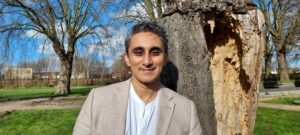
CRIME AUTHOR VASEEM KHAN
Today I chat with successful crime author Vaseem Khan about India, the craft of writing and his highly personal approach to avoiding DIY.
Vaseem is the author of two award-winning crime series set in India.
In 2021, Midnight at Malabar House, the first in the Malabar House novels set in 1950s Bombay, won the Crime Writers Association Historical Dagger, the world’s most prestigious prize for historical crime fiction. The Sunday Times said of the book “This is historical crime fiction at its sharpest.”
Interview: Crime author Vaseem Khan
Vaseem Khan, you have a finger in many pies – you’ve launched two successful series of crime novels, helped establish a chain of eco-hotels, have produced videos on diversity, co-present the podcast “Red Hot Chilli Writers” (with fellow author Abir Mukherjee) – and still had time to work in UCL’s Department of Security and Crime Science – what would you say ties all these together?
Insomnia, restlessness, and a criminal mind!
Less facetiously: I’m a busy person, and find that I’m constantly bombarded by ideas. Not all of them are very good, but when I get one I like, I tend to get up and do something about it. All of these activities are just different ways of expressing my personality… of which I’ve often been accused of having an excess.
(And sometimes the muse deserts you. Continually coming up with new ideas for a book, for instance, is like trying to pull the teeth from a crocodile while you’ve got your head in its mouth.)
India’s first female police inspector
You’ve just launched a new book – “The Dying Day” What was your inspiration for the story?
I lived in India for a decade in my twenties and as a result I write crime novels set there, though I was born and grew up in London. The Dying Day is the second in my Malabar House series, set in 1950s Bombay.
The first, Midnight at Malabar House, introduced India’s first female police Inspector – Persis Wadia. She’s posted to Bombay’s smallest police station – Malabar House – where all the rejects and undesirables are sent. And then a sensational murder – of an English diplomat – falls into her lap.
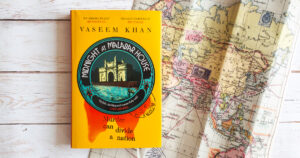
Persis is working with Archie Blackfinch, an English forensic scientist based in Bombay. They get off to a rocky start, but we immediately know this is going to be one of those will-they-wont-they situations!
Examining the Raj
1950 is just three years after Indian independence, the assassination of Gandhi, and the horrors of Partition when colonial India was split along religious lines into Pakistan, India, and East Pakistan (Bangladesh). Writing about this period allows me to examine the Raj – and how Independent India subsequently adjusted to becoming the world’s largest democracy.
And I should say that Midnight at Malabar House is currently shortlisted for one of the UK’s biggest crime fiction awards – the Theakston’s Old Peculier Crime Novel of the Year.
In The Dying Day we discover that one of the world’s great treasures, a 600 year old copy of Dante’s The Divine Comedy is stolen from Bombay’s Asiatic Society, leaving behind a trail of complex riddles and bodies.
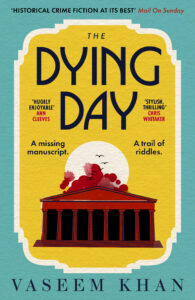
The Dante manuscript is a real artefact – Mussolini once tried to buy it for a million dollars! – and demonstrates how so many cultures, not just the British, interacted with India and left their mark. The most satisfying thing about that book is that of the large number of readers who’ve written to me from around the world, only one has claimed to have solved all the riddles…
Early steps and literary soirees
Can you tell us a bit about your background? How did you start off? What sparked your interest in writing and when?
I wrote my first novel aged 17 – a Terry Pratchett-esque comic fantasy – I was reading a lot of the Discworld series. Needless to say, it was rubbish! I wrote 6 more novels across 23 years and various genres before finally being published at age 40. Since then 8 books have followed with Hodder & Stoughton, across two series.
Do you feel that early training and career has influenced your writing in any way, positively or negatively.?
Writing is a craft – the more you do it, the better you get at it. Those long years of (unpublished) writing were my apprenticeship. They helped me hone a style that would later become my signature – good prose, complex plots, and a dash of dry humour in between the gritty crime stories.
What I didn’t really train for was the endless literary soirees in the company of sweaty, semi-sozzled fellow writers…
The first bestseller
What do you feel led to your first success? Was there a realisation on your part or a change of approach?
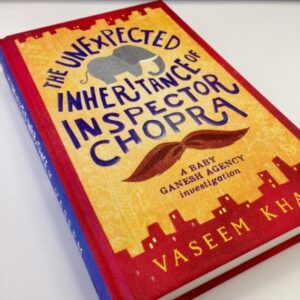
Not so much a change of approach as a change of subject.
I had been writing books set in England and with white leading characters. But then, following my time in India, I wrote The Unexpected Inheritance of Inspector Chopra, about a middle-aged Indian policeman in Mumbai, forced into early retirement, who tackles one last murder… and also inherits a one-year-old baby elephant!
The book was a bestseller, published around the world, and became a Sunday Times pick for the 40 best crime novels published 2015-2020.
Four more followed in that series and laid the foundation for my writing career. You can buy the book at local bookstores or here: https://amzn.to/3babjnq
I have to say it was the first book of yours I read and I highly recommend it.
Behind the scenes
Do you take up any political positions? Support any party? Or cause? Do you feel your writing reflects your views or do you deliberately avoid any such influences?
Any writer who claims they avoid political positions is lying through their teeth!
It’s impossible to write a full-length novel without your own opinions leaking onto the pages. So my books showcase India as I see her: I explore poverty, caste prejudice, misogyny, colonialism – and I do so because I know my readers are keen to engage with these topics.
They expect more from my novels than just a good murder mystery.
How do you write? I think both writers and readers are interested in the mechanics – do you have fixed hours or a target word count? A favourite place? A special pencil?
I plot in detail and use a spreadsheet to plan out every ‘scene’ in the book, complete with clues, red herrings, and alternate suspects. I then layer in background detail, and an overall theme I want to explore. So in Midnight at Malabar House, for instance, I wanted to showcase how Partition created communal tension in post-Independence India.
Once I begin writing I rattle along at about 1000 words a day – early in the morning when my brain still works!
In terms of place I sometimes write on a cricket pitch. This is because when I play I normally get out very quickly and then I have nothing to do but sit on the sidelines swearing at my teammates… or writing.
Away from the computer
What do you read? And, perhaps equally importantly, given how much a writer has to spend time on writing and publicising, how do you find time to read it?
Writers who claim they have no time to read make no sense to me. It’s like saying you’re a chef who has no time to eat!
I read widely: literary, crime, contemporary. Reading is how even seasoned writers continue to learn. My favourite crime writer is Michael Connelly (Harry Bosch novels).
I also love literary authors Salman Rushdie and John Irving.
What do you do for fun? (Not to say that writing can’t be fun). How do you spend your time off?
I play cricket – badly!
(And I attempt to avoid doing home DIY. It’s a sort of guerrilla war, with my wife, who’s always on at me to fix this or that. It can be fun inventing wild excuses to get out of such chores… such as the time I claimed to have lost all feeling in my right arm.)
And now?
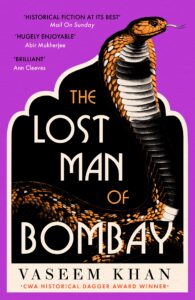
What’s next for you?
The third in the Malabar House series, The Lost Man of Bombay, is out in hardback in August, so I’m getting ready to promote that – any advance orders welcome.
Frankly, if I was a reader, I’d buy it just for the amazing cobra on the cover!
In this one, a white man is found frozen to death in a cave in the Himalayan foothills. He’s been up there a while and his face is crushed, making his identity a mystery.
When the case lands on Persis’ desk, she discovers a notebook on the body holding a series of intriguing clues. As Persis and Archie investigate, more murders occur in Bombay… of Europeans … Could there be a serial killer loose in the city?
By the way, there’s plenty of good stuff on my website, including free articles about India, creative writing tools, and a newsletter with free short stories, competitions, and book giveaways. Website: http://vaseemkhan.com
How to buy Vaseem Khan’s books
Vaseem Khan’s books are available in bookstores and online. Further details of how to buy his latest paperback The Dying Day are also available via his website here: https://vaseemkhan.com/the-dying-day/
To advance order The Lost Man of Bombay: https://www.waterstones.com/book/the-lost-man-of-dehra-dun/vaseem-khan/9781529341102
Contact Vaseem Khan
Facebook: https://www.facebook.com/VaseemKhanOfficial/
Twitter: https://www.twitter.com/VaseemKhanUK

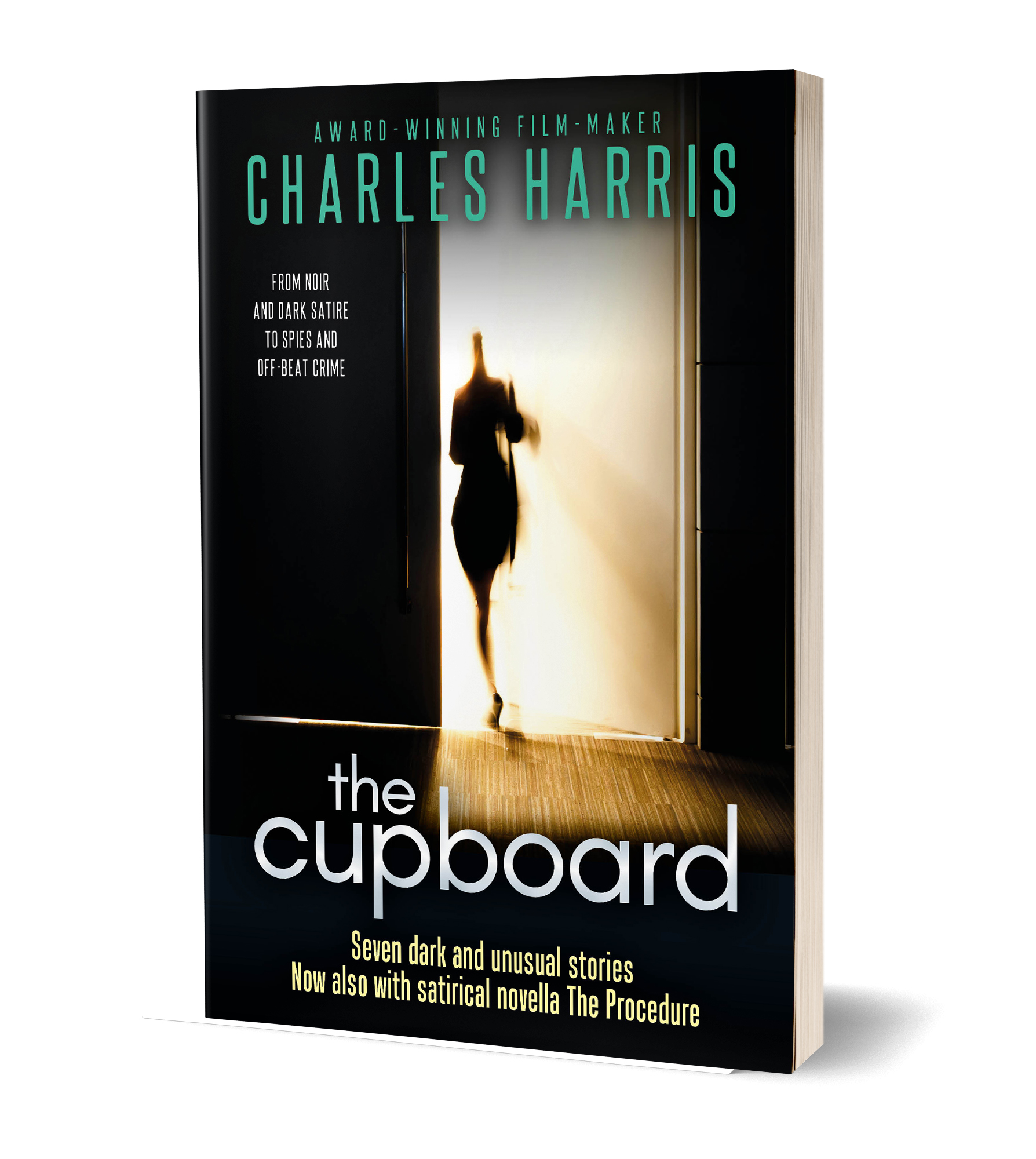
Tell people what you think